|
|
Seeds of Fire: A People’s Chronology
Recalling events that happened on this day in history.
Memories of struggle, resistance and persistence.
Compiled by Ulli Diemer
|
May 1 - May Day
|

|
May Day – International Workers’ Day
May Day has been celebrated as a spring festival in the northern hemisphere since ancient times. It was associated with Walpurgis Night celebrations in Germanic countries, with the Roman festival for the goddess Flora, and with the Gaelic Beltane.
Its origins as International Workers’ Day grow out of the 1886 Haymarket Affair in Chicago, when a bomb is thrown at police at a rally for the eight-hour day, an act for which four anarchists who were present in the crowd are subsequently hanged. The execution of the four men despite the lack of any evidence linking them to the bombing causes international outrage.
In 1889 the founding conference of the Socialist International calls for international demonstrations on May 1, 1890 to commemorate the Haymarket Affair.
The event draws large crowds in several countries, and becomes an annual affair, as workers in countries around the world begin to mark May Day as International Workers’ Day. Governments and employers often resist the recognition of May Day as a holiday, and early May Day marches are frequently attacked by police. In the United States and Canada, governments declare the first Monday in September as a “Labour Day” holiday in order to undermine May Day. In many other countries, workers eventually succeed in having May Day made an official holiday.
|
|
May 1623
|
|
|
English colonists in what is now the U.S. state of Virginia finally agree to negotiate a peace agreement with the indigenous Powhatans, whose land they have been continuously seizing since the colony was founded in 1607.
A solemn peace ceremony takes places in Jamestown, attended by the colonists and by 250 Powhatans. At a carefully chosen moment, the leader of the colonists proposes a toast to celebrate the accord.
The drinks which the colonists hand to the Powhatans have been meticulously prepared: they are all laced with poison. 200 Powhatans die on the spot. 50 who fail to succumb to the poison are slaughtered by the colonists. The man who masterminded the poisoning, Dr. John Pott, is subsequently rewarded by being chosen Governor of the Colony of Virginia.
|
|
May 1, 1891
|
|
|
Police in Fourmies, France, open fire on a peaceful May Day march of workers demonstrating for the eight-hour day, killing nine, and wounding 35, including women and children.
|
|
May 1, 1910
|
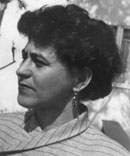
|
|
Birth of Raya Dunayevskaya (1910-1987), Marxist-Humanist philosopher.
|
|
May 1 - 3, 1929
|
|
|
Police in Berlin attack Communist May Day demonstrators, killing 27 and injuring hundreds.
|
|
May 1, 1933
|
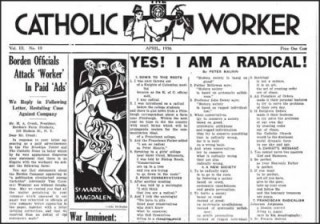
|
|
Publication of the first issue of the Catholic Worker, marking the beginning of the Catholic Worker Movement.
|
|
May 1, 1946
|
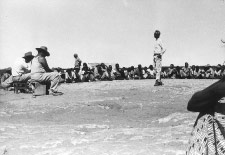
|
|
The Pilbara Strike: Indigenous pastoral workers in the Pilbara region of Australia walk off the job. The strike goes on until 1949, and is considered a major landmark in the struggle of indigenous Australians for their rights.
|
|
May 1, 1960
|
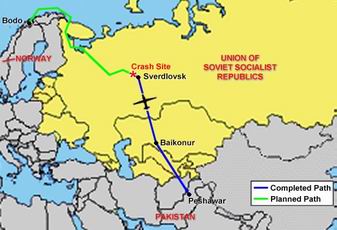
|
|
The Soviet Union shoots down an American U2 spy plane deep over Soviet territory. The flight is part of a series of U.S. spy flights which rely on the inability of the Soviet air defense systems to reach the high-altitude U2s. When the plane is lost, the U.S. first denies that the plane was on a spy mission, claiming that it was a weather research aircraft that had accidentally strayed across the Soviet border and that there “was absolutely no deliberate attempt to violate Soviet airspace and never has been.” Soviet premier Nikita Krushchev then reveals that the plane was shot down more than a thousand kilometres inside Soviet territory, that the surveillance equipment on the plane has been recovered intact, and that the pilot, Francis Gary Powers, has been captured alive. The U.S. then concedes the Soviet account is accurate, but refuses to apologize.
|
|
May 1, 1970
|
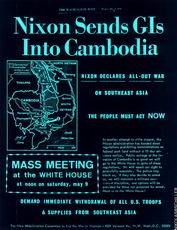
|
|
The United States, unable to achieve victory in its war against Vietnam, widens the war by invading Cambodia and beginning massive bombing raids over the Cambodian countryside. The invasion is met by nation-wide protests in the United States.
|
|
May 1, 1971
|
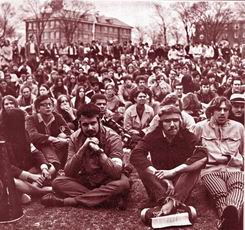
|
|
Large-scale civil disobedience actions begin in Washington protesting the American war against Vietnam. Over the next few days, some 13,000 people are arrested. The mass arrests help to turn public opinion further against the government and against the war.
|
|
May 1972
|
|
|
The first issue of the feminist newspaper The Other Woman is published in Toronto.
|
|
May 1, 1977
|
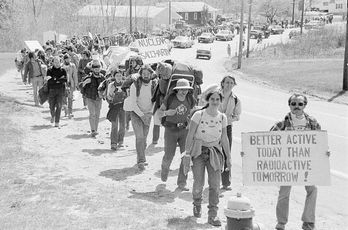
|
|
Following a 24-hour occupation of two proposed nuclear power plant sites in Seabrook, New Hampshire, 1,414 people are arrested.
|
|
May 1, 1986
|
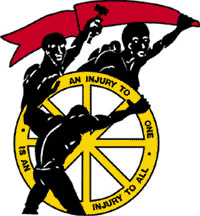
|
|
One million South Africans demonstrate their opposition to apartheid in a strike organized by the trade union federation COSATU.
|
|
For more information about people and events in Seeds of Fire, explore these pages:
|
|
|
|
|
|

